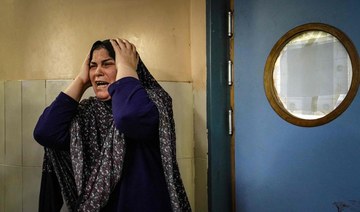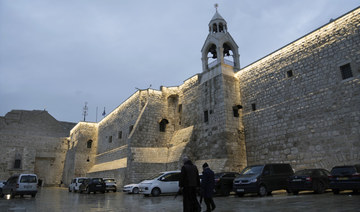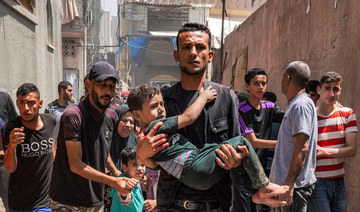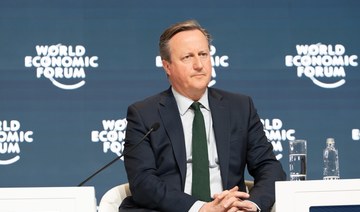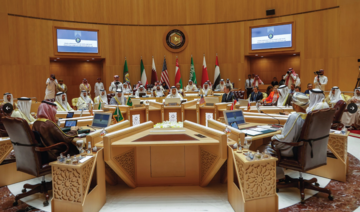JERUSALEM: Residents of Israeli-annexed east Jerusalem’s historic Armenian quarter rapidly mobilized when bulldozers rolled in to start work on a luxury hotel, a project they fear threatens the ancient but dwindling community.
The real estate deal which gives an Australian-Israeli investor roughly 25 percent of the Old City’s Armenian quarter has sparked anger and concern among its residents.
“The youth arrived in large numbers and positioned themselves in front of the bulldozers,” recalled resident Kegham Balian of the escalation last month.
“The settlers underestimated our community,” said the Armenian merchant.
“We are waging a peaceful struggle, and we are not afraid.”
Ever since the construction began, Armenians have set up camp, bringing tents, stoves, mattresses and even a TV to a weeks-long sit-in to guard the contested land.
Inside a tent, wooden planks patch up the holes left by construction equipment.
On Thursday, “over 30 armed provocateurs” attacked members of the Armenian community including clergymen, the Armenian Patriarchate of Jerusalem said in a statement.
It accused the real estate developer, Danny Rothman, of being responsible for the “massive and coordinated physical attack” shortly after the patriarchate had taken to the court to annul the controversial land sale.
East Jerusalem and the Old City — divided into Muslim, Christian, Jewish and Armenian quarters — was seized by Israel in 1967 and annexed in a move not recognized by the international community.
Land rights are a key point of tension in east Jerusalem and the occupied West Bank, where Israel has built and expanded settlements, considered illegal under international law.
Only around 2,000 Armenians remain in the Old City quarter after waves of immigration primarily to the United States and Europe since the 1960s.
Like Palestinians in the rest of east Jerusalem, most Armenians do not hold Israeli citizenship but only residency.
Panic first erupted among the minority community in April, after it was revealed that the Armenian Patriarchate of Jerusalem and Father Baret Yeretzian, in charge of real estate affairs, struck a deal in 2021 with a Tel Aviv-based company.
The firm, which won a 99-year lease on the land, is Rothman’s Xana Gardens Ltd, according to Israeli lawyer and Jerusalem specialist Daniel Seidemann.
“The agreement was reached by the patriarchate without the knowledge and without the consent of the residents of the Armenian quarter or their institutions,” Seidemann told AFP, an assertion echoed by community members.
The contract included “11,500 square meters (2.8 acres) of land, including a parking lot, five residences, and the patriarchate’s seminar hall,” said Setrag Balian, co-founder of Save the ArQ, a movement by Armenian quarter residents.
Despite the Armenian Patriarchate saying it had subsequently “withdrawn from negotiations” after discovering “problems behind this transaction,” many community members still feel betrayed.
Yeretzian, the priest behind the contract has been defrocked.
The latest escalation came after Nourhan Manougian, the Armenian patriarch of Jerusalem, on October 27 sent a letter to Xana Gardens formally notifying the firm of the “cancelation of the agreement.”
Then, “bulldozers, armed settlers accompanied by dogs, and residents of the Jewish quarter” arrived to the area, said the activist Balian, 27.
The takeover attempt “took advantage of the chaos of October 7,” he said, referring to the bloody attack by Palestinian militant group Hamas on Israel that triggered all-out war.
“They managed to demolish part of the wall surrounding the parking lot.”
Rothman’s lawyer, Avi Savitzki, declined to comment when contacted by AFP.
Campaigners say they are trying to preserve the land of the Armenian community, whose presence in Jerusalem dates as far back as 1,500 years.
Save the ArQ is also supported by Armenian diaspora communities with legal assistance and media coverage.
“Every day, families come to see us and bring us food,” said Kegham Balian of the sit-in, where young and old take turns sleeping at the site.
They hope the land does not befall the same fate of some Greek Orthodox Church property in Jerusalem.
Israeli settler group Ateret Cohanim, using front companies, in 2004 acquired leasing rights on three building belonging to the church.
After years legal battles, Israel’s top court eventually allowed Ateret Cohanim to take hold of the property.
This judicial setback “endangers the Christian presence and the integrity of the Christian quarter,” said activist Hagop Djernazian.
To Balian, “we know the political stakes” in the divided holy city, a focal point of the Israeli-Palestinian conflict.
“It will not be an easy battle, especially since we are not just fighting against a private company but also against settlers,” he said.
But “we are ready.”
Jerusalem’s Armenians vow to keep up fight against ‘settler’ project
https://arab.news/8ggwc
Jerusalem’s Armenians vow to keep up fight against ‘settler’ project
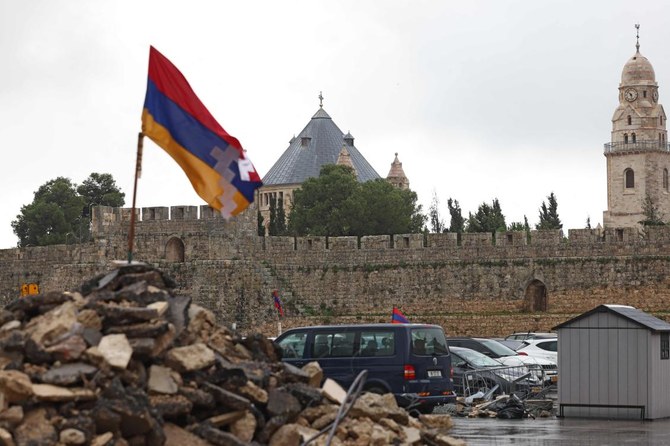
- The real estate deal which gives an Australian-Israeli investor roughly 25 percent of the Old City’s Armenian quarter has sparked anger and concern among residents
’We are with them’: Lebanon students rally for Gaza
Some students also carried banners declaring solidarity with south Lebanon, where Israel and Hamas-ally Hezbollah have exchanged near-daily cross-border fire since October
BEIRUT: Hundreds of university students in Lebanon protested on Tuesday against Israel’s bombardment of Gaza, inspired by recent pro-Palestinian demonstrations that have rocked US and European campuses, AFP correspondents said.
Dozens of students gathered at the prestigious American University of Beirut (AUB), some wearing the traditional Arab keffiyeh scarf that has long been a symbol of the Palestinian cause, an AFP photographer said.
“We are Palestine’s neighbors. If we do not stand with them today, who will?” asked AUB student Zeina, 23, declining to provide her surname.
“Around the world, students my age, from our generation, are the ones raising their voices,” she added.
The Gaza war began after Palestinian militant group Hamas’s unprecedented October 7 attacks on southern Israel, which resulted in the deaths of 1,170 people, mostly civilians, according to an AFP tally of Israeli official figures.
Hamas also took some 250 hostages. Israel estimates that 129 remain in Gaza, including 34 believed to be dead.
Israel’s retaliatory offensive, aimed at destroying Hamas, has killed at least 34,535 people in Gaza, mostly women and children, according to the health ministry in the Hamas-run territory.
The protests came as Hamas said it was considering a plan for a 40-day ceasefire and the release of scores of hostages in exchange for larger numbers of Palestinian prisoners.
Some students also carried banners declaring solidarity with south Lebanon, where Israel and Hamas-ally Hezbollah have exchanged near-daily cross-border fire since October.
The protests came as similar demonstrations swept universities across the United States, posing a challenge to administrators trying to balance free speech with complaints that the rallies have veered into anti-Semitism.
Footage of police in riot gear called in by universities to break up the rallies has circulated worldwide, recalling the protest movement that erupted during the Vietnam War.
“We renew our demand to stop the American-backed Israeli genocide against Palestinians and urgently demand to stop Zionist (Israeli) attacks” on south Lebanon, a female student told the crowd at AUB, praising “the global student movement supporting our people.”
At the nearby Lebanese American University, dozens of students gathered, raising Palestinian flags and burning an Israeli one.
“We want to convey a message to our people in Gaza: we are with them... We have not forgotten them,” Lara Qassem, 18, told AFP.
In Lebanon, at least 385 people have been killed in months of cross-border violence, mostly fighters but also including 73 civilians, according to an AFP tally.
Israel says 11 soldiers and nine civilians have been killed in the country’s north.
Arab-European ministerial statement: We endorse efforts toward achieving a Gaza ceasefire
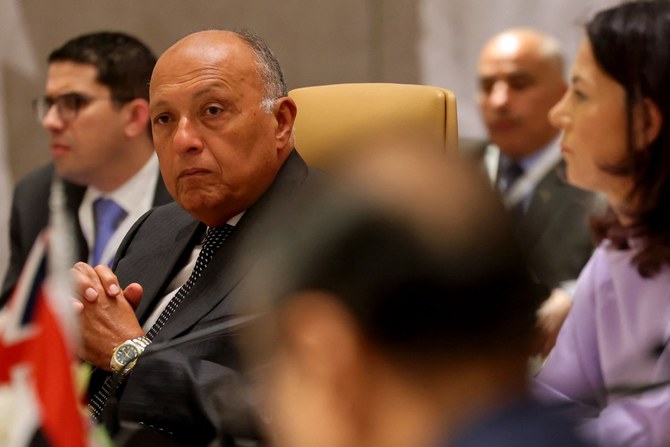
RIYADH: A joint statement from Arab and European foreign ministers highlighted critical priorities in addressing the ongoing conflict in Gaza, following a meeting in Saudi Arabia's capital, Riyadh, on Tuesday.
The statmenet called for the urgent need to halt all unilateral violations in Palestinian territories. It also called for the release of prisoners and hostages, putting an end to the war in Gaza and all illegal unilateral actions and violations in the occupied Palestinian territories, including East Jerusalem.
The meeting was chaired by Saudi Minister of Foreign Affairs Prince Faisal bin Farhan and Norwegian Foreign Minister Espen Barth Eide.
It was also attended by foreign ministers and representatives from Bahrain, Portugal, the European Union, Algeria, Jordan, Germany, the United Arab Emirates, Spain, Ireland, Italy, Belgium, Turkey, the Arab League, Slovenia, France, Palestine, Qatar, Egypt, and the United Kingdom.
Ministers reiterated their support for efforts aimed at achieving a ceasefire in Gaza. They emphasized the importance of establishing a unified Palestinian government in both the West Bank and Gaza.
Recognizing the significance of internal unity among Palestinians, the ministers have called for concerted efforts to overcome divisions and work towards a common goal of self-governance and statehood.
The statement also called for adopting a reliable and irreversible path towards implementing the two-state solution.
Arab and European foreign ministers were gathered in Riyadh on the sidelines of a two-day World Economic Forum special meeting.
Israel police say Turk shot dead after stabbing officer in Jerusalem
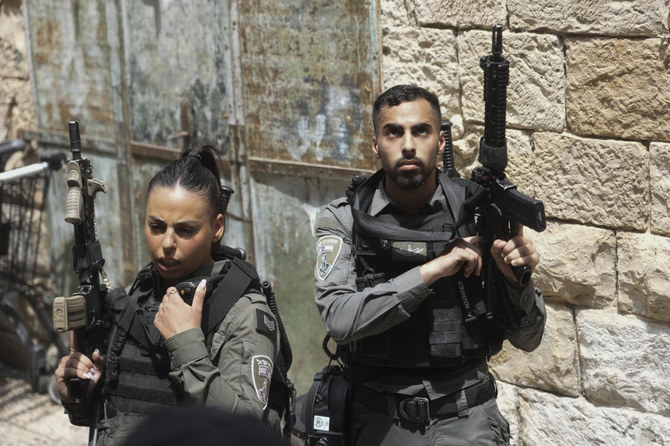
JERUSALEM: A Turkish national stabbed and moderately wounded an Israeli police officer in annexed east Jerusalem before being shot dead on Tuesday, police said.
Police said that a “terrorist armed with a knife arrived in the Old City of Jerusalem, on the Herod’s Gate Ascent street, charged at a border police officer and stabbed him with a knife.”
It said another officer at the scene “neutralized the terrorist” and the attacker was later pronounced dead.
Netanyahu vows to invade Rafah ‘with or without a deal’ as ceasefire talks with Hamas continue
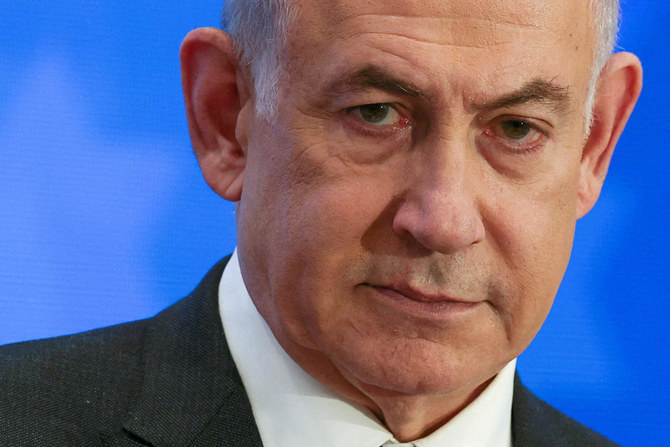
- Netanyahu said Israel would enter Rafah to destroy Hamas’ battalions there “with or without a deal”
- The international community have raised an alarm over the the fate of civilians in Rafah
TEL AVIV: Israeli Prime Minister Benjamin Netanyahu pledged Tuesday to launch an incursion into the southern Gaza city of Rafah, where hundreds of thousands of Palestinians are sheltering from the almost 7-month-long war, as ceasefire negotiations between Israel and Hamas appear to be gaining steam.
Netanyahu’s comments came hours before US Secretary of State Antony Blinken arrives in Israel to advance the truce talks — which appear to be one of the most serious rounds of negotiations between Israel and Hamas since the war began. The deal is meant to free hostages, bring some relief to the population and avert an Israeli offensive into Rafah and the potential harm to civilians there.
Speaking to a group of bereaved families and one organization representing families of hostages held by militants, Netanyahu said Israel would enter Rafah to destroy Hamas’ battalions there regardless of whether a truce-for-hostages deal was struck or not.
“The idea that we will stop the war before achieving all of its goals is out of the question,” Netanyahu said, according to a statement from his office. “We will enter Rafah and we will eliminate Hamas’ battalions there — with or without a deal, to achieve the total victory.”
Netanyahu has faced pressure from his nationalist governing partners not to proceed with a deal that might prevent Israel from invading Rafah, which it says is Hamas’ last major stronghold. His government could be threatened if he agrees to a deal because hard-line Cabinet members have demanded an attack on Rafah.
But with more than half of Gaza’s 2.3 million people sheltering there, the international community, including Israel’ top ally the US, has warned Israel against any offensive that puts civilians at risk.
It was not clear if Netanyahu’s comments were meant to appease his governing partners or whether they would have any bearing on any emerging deal with Hamas.
Netanyahu was addressing the Tikva Forum, a small group of families of hostages that’s distinct from the main group representing the families of captive Israelis that has indicated it prefers to see Hamas crushed over the freedom of their loved ones. Families and their supporters have demonstrated in the thousands every week for a deal that would bring the hostages home, saying it should take precedence over military action.
The current deal being discussed, brokered by the US, Egypt and Qatar, would see the release of dozens of hostages in exchange for a six-week halt in fighting as part of an initial phase, according to an Egyptian official and Israeli media. Hundreds of Palestinian prisoners held by Israel would also be released.
But a sticking point remains over what happens next. Hamas has demanded assurances that an eventual release of all hostages will bring a complete end to Israel’s nearly seven-month assault in Gaza and a withdrawal of its troops from the devastated territory. Israel has offered only an extended pause, vowing to resume its offensive once the first phase of the deal is over. The issue has repeatedly obstructed efforts by the mediators during months of talks.
Netanyahu has repeatedly rejected stopping the war in return for hostage releases, and says an offensive on Rafah is crucial to destroying the militants.
The Israel-Hamas war was sparked by the unprecedented Oct. 7 raid into southern Israel in which militants killed around 1,200 people, mostly civilians, and abducted around 250 hostages. Israel says the militants are still holding around 100 hostages and the remains of more than 30 others.
The war in Gaza has killed more than 34,000 Palestinians, according to local health officials. The war has driven around 80 percent of Gaza’s population of 2.3 million from their homes, caused vast destruction in several towns and cities, and pushed northern Gaza to the brink of famine.
Blinken heads to Jordan to push Gaza aid
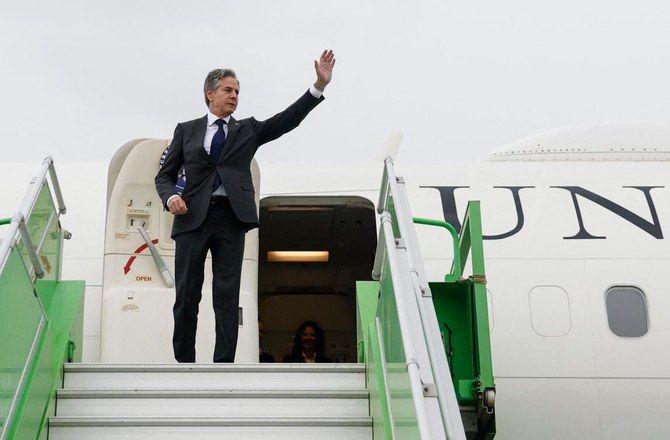
- Blinken flew to Amman after talks with Gulf Arab leaders in Riyadh
- The US top diplomat will meet Jordan’s King Abdullah II and Foreign Minister Ayman Safadi
RIYADH: US Secretary of State Antony Blinken headed Tuesday to Jordan where he will discuss ways to boost aid deliveries into Gaza and quietly thank the kingdom for its help during recent Iran-Israel clashes.
Blinken flew to Amman after talks with Gulf Arab leaders in Riyadh, part of his seventh tour of the region since the October 7 attack by Hamas on Israel.
The US top diplomat will meet Jordan’s King Abdullah II and Foreign Minister Ayman Safadi as well as the UN humanitarian aid and reconstruction coordinator for Gaza, Sigrid Kaag.
Later in the day, Blinken will head to Israel where he will discuss the latest negotiations aimed at securing a temporary ceasefire and a release of hostages.
President Joe Biden’s administration, despite criticism abroad and rising fury on US university campuses, has supported Israel in its relentless campaign against Hamas but also urged its ally to do more to protect civilians.
“President Biden has insisted that Israel take specific, concrete, measurable steps to better address humanitarian suffering, civilian harm and the safety of aid workers in Gaza,” Blinken told Gulf Arab foreign ministers in Riyadh on Monday.
“We have seen measurable progress in the last few weeks, including the opening of new crossings, an increased volume of aid delivery to Gaza and within Gaza, and the building of the US maritime corridor, which will open in the coming weeks,” Blinken said.
“But it is not enough. We still need to get more aid in and around Gaza,” he said.
Biden warned Israel that future support was at stake after an April 1 Israeli strike killed seven aid workers from World Central Kitchen, the charity founded by celebrity Spanish-American chef Jose Andres.
The United States said that Israel has since taken steps to avoid such deaths in the future, including coordinating more directly with aid groups working in Gaza.
But the situation remains dire in Gaza, where the vast majority of residents have fled their homes and the United Nations has warned of looming famine.
The Biden administration is addressing the crisis by building a temporary pier to bring in aid, an extraordinary step to deal with concerns about a friendly country and major recipient of US assistance.
Jordan, which has diplomatic relations with Israel and a large Palestinian population, is especially sensitive to tensions in the Palestinian territories.
Earlier in April, Jordan shot down Iranian drones fired at Israel in response to a deadly air strike on the Iranian consulate in Syria.
Jordan, while working with the United States, has insisted that it does not want to be caught in the middle of the conflict.



